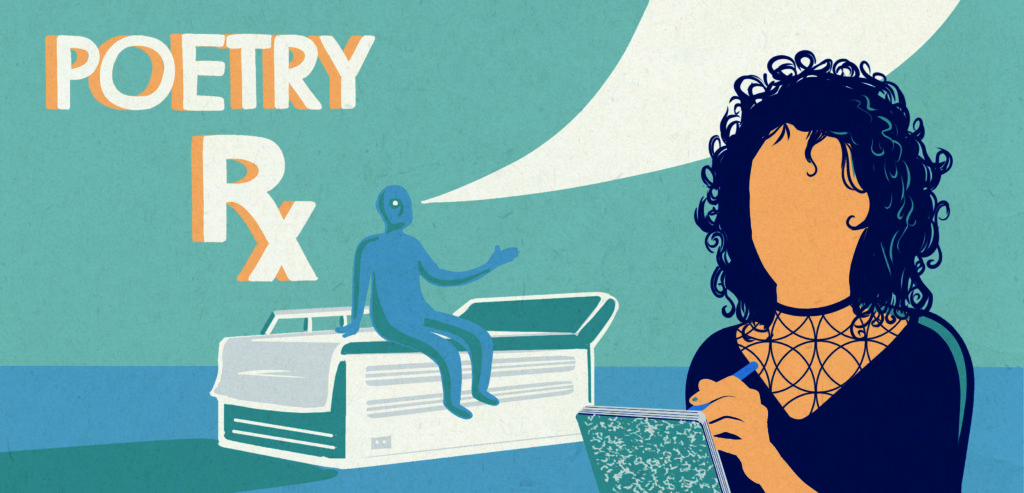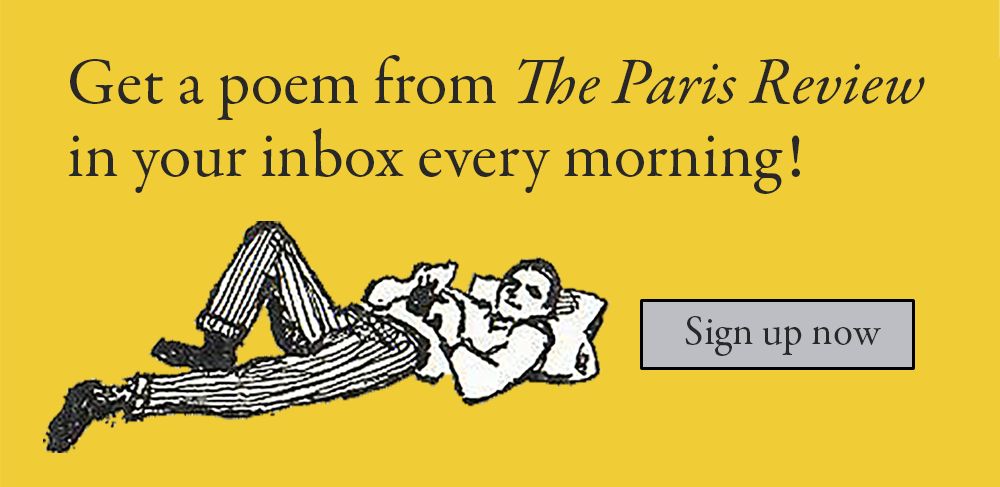In our column Poetry Rx, readers write in with a specific emotion, and our resident poets—Sarah Kay, Kaveh Akbar, and Claire Schwartz—take turns prescribing the perfect poems to match. This week, Claire Schwartz is on the line.
Dear Poets,
Is there a word for the feeling when you know the wise thing to do, but you, always a fool, do the opposite? I wish I knew the word—I would have said it when this boy slept a night by my side. I would have said it when I first lost him, and then six months later he came back for me. I would have said it, even if only a whisper, when I fell for him all over again, even harder than before. And now I would repeat it to myself, like a benediction, as I face the possibility of him drifting away.
That is the feeling for which I need a poem. The feeling when you know that he is going to leave, and you are remembering how hard it was to lose him the first time, and this time you are in deeper, and you know you should cut it off now to reduce the heartache a little, but you foolishly continue to hope. The feeling every lover has, before sadness makes them wise.
Sincerely,
A Hopeful Fool
Dear Hopeful Fool,
I love your letter. What you are seeking—a word for a feeling you know but have no language for—gets exactly at one reason I hold poems close: not necessarily to choose differently, but to experience differently.
For you, Mary Szybist’s “The Troubadours Etc.”:
Just for this evening, let’s not mock them.
Not their curtsies or cross-garters
or ever-recurring pepper trees in their gardens
promising, promising.
At least they had ideas about love.
I think one word for what you describe is the one you use: hope. But hope’s wisdom buckles when the vision it was pinned to dissipates. So here is a sturdier word: faith. Faith’s intelligence is not bound to the outcome of any single situation; faith is something surer that you build when you choose the not-knowing. Faith marks an interior constitution, a way of being that says more about the self than it says about any external event. “At least they had ideas about love.”
Sadness is not the only province of your wisdom. There is also the intelligence of trying, and the courage of making yourself vulnerable to the unlikeliness of being held because the possibility of being held is so beautiful. Listening to your instinct is real and crucial. But that is already a wisdom you recognize. So, I give you Szybist’s poem as a reminder that there is also a brightness—an intelligence—to surrender.
The Puritans thought that we are granted the ability to love
only through miracle,
but the troubadours knew how to burn themselves through,
how to make themselves shrines to their own longing.
The spectacular was never behind them.
What a self you’re building when you see even a flicker of possibility and walk toward that. You get to honor that impulse, too.
—CS
*
Dear Poets,
I have a parent who has a degenerative disease and will be getting sicker and sicker over the next years; ultimately it will be fatal. Not a super sunny situation but I’d love a poem for it.
Best,
Living with Dying
Dear Living with Dying,
A few years ago, I heard the poet Solmaz Sharif read. Afterwards, someone asked about joy. Sharif responded: “Sometimes I think there’s not enough joy in my poems. But then, I think there’s an aliveness I feel when I’m grieving that’s kin to joy.” And she told this story: Speaking to a group, the Zen master Thich Nhat Hanh instructed audience members to give the person next to them a hug. People complied, reluctantly, awkwardly. Then, Thich Nhat Hanh reissued the instruction, slightly modified: “Turn to the person next to you. Give them a hug with the knowledge that you both will die.” Now, the embraces brimmed with care. The action didn’t change, but the imminent awareness of death altered its quality.
Degenerative illnesses are difficult for so many reasons. One reason, I think, is that even the name of that category sharpens the sense of living as vector toward dying. Faced with the magnitude of what is coming, what else is there? For you, a poem that, like Thich Nhat Hanh’s wisdom, faces that hovering awareness of death and, replies: so much else, especially now. Jane Kenyon’s “Otherwise”:
I got out of bed
on two strong legs.
It might have been
otherwise. I ate
cereal, sweet
milk, ripe, flawless
peach. It might
have been otherwise.
Kenyon wrote this poem shortly before her death from leukemia at the age of 47. In the poem’s final lines, the roomier subjunctive shifts, replaced by the sureness of a future tense:
I slept in a bed
in a room with paintings
on the walls, and
planned another day
just like this day.
But one day, I know,
it will be otherwise.
What will come does not undo what is; rather, it polishes the daily miracle. To sleep in a room with paintings! To be with the one you love! These are not flashy false promises. What Kenyon marks instead is that our attention to the present grants us a temporary dwelling space. And, after all, what else is there?
I am so sorry that you and your parent are experiencing this illness. I hope, in its persistent awareness of that “otherwise,” Kenyon’s poem offers you, if not solace, then a kind of respite. There is the possibility of a fuller presence alongside the difficult truths.
—CS
*
Dear Poets,
I am at a crossroads in my life. I finished college not long ago and am now looking for a first job. This of course means setting foot in the land of the adults. A land with an infinite amount of possibilities but also responsibilities and it’s the latter that has my anxiety skyrocketing. I am on a precipice with the future below me and I know that I just need to jump and probably will end up on my feet but doubts and anxiety keep me from taking the step. Any poems that can inspire me to jump in the void of possibilities?
Thank you,
Seeking Courage
Dear Seeking Courage,
Sometimes, when I am feeling overwhelmed by a single large task, I try to clear away all of the little things. I clean the apartment, reply to emails I’ve been avoiding, run errands I’ve been putting off. I tell myself that if I just make the proper space, I will be able to turn my best attention to the thing that really matters. Inevitably, life swells to fill the space I’ve cleared, and what I pretended was necessary preparation is actually just elaborate procrastination. There will always be more cleaning, more emails, more errands. What I mean is: there will always be a reason not to try the thing that scares you with how much it matters. But you hold life at arm’s length forever. I hear in your letter that you want to dive in to yours headfirst. For you, a poem that helps me take that plunge—Gwendolyn Brooks’s “The Second Sermon on the Warpland”:
This is the urgency: Live!
and have your blooming in the noise of the whirlwind.
You’re right. Possibility brings with it responsibility. The thing about possibility, though, is that turning away from it doesn’t make it less true; it only makes it less full. The possibility you are facing is the possibility of filling your life to its fullest. What a beautiful thing to feel responsible to, to feel responsible among.
In the wild weed
she is a citizen,
and is a moment of highest quality; admirable.
Trying is no guarantee of success, but working at something you love is a guarantee of expanding your capacity to love. You don’t have to resolve your anxiety or suppress your doubt. You just have to move toward what you love in the midst of all that is true. Let that be the truest thing.
Nevertheless, live.
Conduct your blooming in the noise and whip of the whirlwind.
—CS
Want more? Read earlier installments of Poetry Rx. Need your own poem? Write to us!
Claire Schwartz is the author of bound (Button Poetry, 2018). Her poetry has appeared in Apogee, Bennington Review, The Massachusetts Review, and Prairie Schooner, and her essays, reviews, and interviews have appeared in The Iowa Review, Los Angeles Review of Books, Virginia Quarterly Review, and elsewhere.
from The Paris Review https://ift.tt/2Pf1FR5


Comments
Post a Comment